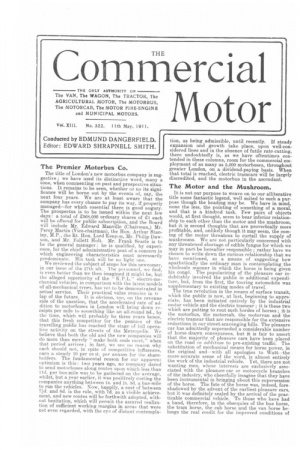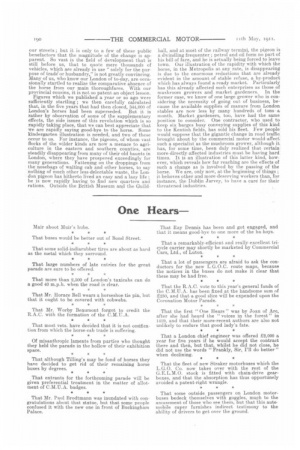The Premier Motorbus Co.
Page 1

Page 2

If you've noticed an error in this article please click here to report it so we can fix it.
The title of London's new motorbus company is suggestive; we have used its distinctive word, many a time, when commenting on past and prospective situations. It remains to be seen, whether or no its significance will be borne out by the events of, say, the next four years. We are at least aware that the company has every chance to pay its way, if properly managed—for which essential there is good augury. The prospectus is to be issued within the next few days : a total of 2566,000 ordinary shares of LI each will be offered for public subscription, and the Board will include Mr. Edward Manville (Chairman) Mr. Percy Martin (Vice-chairman), the Hon. Arthur Stanley, M.P., the Rt. Hon. Lord Kenyon, Mr. Philip Dawson, and Mr. Follett Holt. Mr. Frank Searle is to be the general manager : he is qualified, by experience, for the chief administrative post of a concern in which engineering characteristics must necessarily predominate. His task will be no light one.
We reviewed the subject of scope for this newcomer, in our issue of the 27th ult. The lie] sonnel, we find, is even better than we then imagined it might be, but the alleged superiority of the " K.P.L." electro-meehanical vehicles, in comparison with the latest models of all-mechanical tyPes, has vet to be demonstrated in actual service. Their practical value remains in ti• lap of the future. It is obvious, too, on the revenue side of the question, that the accelerated rate of addition to motorbuses in London will bring down receipts per mile to something like an all-round 9d., by the time, which will probably be three years hence, that this fresh competitor for the pennies of the travelling public has reached the stage of full operative activity on the streets of the Metropolis. We believe that both the old and the new companies will do more than merely "make both ends meet," when that period arrives ; in fact, we see no reason why each should not, in spite of competitive influences, earn a steady 10 per ce it. per annum for the shareholders. The fundamental reason for our apparent optimism is this : two years ago, no company dared to send motorbuses along routes upon which less than lid, per bus-mile was to be gathered on the average, whilst, but a year earlier, it was positively costing the companies anything between Is. and ls. ad. a bus-mile to run the vehicles. Now, happily, a cost of between 7tid. and sd. is the rule, with 7d. as a visible achievement, and new routes will be forthwith adopted, without hesitation, which will permit the assured realization of sufficient working margins in areas that were not even regarded, with the eye of distant contempla tion, as being admissible, until recently. If steady expansion and growth take place, upon well-considered lines and in the absence of futile rate-cutting, there undoubtedly is, as we have oftentimes contended in these columns, room for the commercial employment of as many as 5,000 motorbuses, throughout greater London, on a dividend-paying basis. When that total is reached, electric tramcars will be largely discredited, and the motorbus in the ascendant.
The Motor and the Mushroom.
It is not our purpose to weave on to our alliterative title some fa,ntastic legend, well suited to such a purpose though the heading may be. We have in mind, none the less, the pointing of something of a moral, and that is a kindred task. Few pairs of objects would, at first thought, seem to bear inferior relationship to each other than the motor and the mushroom, but it is second thoughts that are proverbially more profitable, and, unlikely though it may seem, the coming of the motor threatens to curtail the supply of mushrooms. We are not particularly concerned with any threatened shortage of edible fungus for which we may in part be hereafter responsible ; rather have we chosen to write down the curious relationship that we have mentioned, as a means of suggesting how apathetically the ordinary man is contemplating the wholesale manner in which the horse is being given his cong6. The popularizing of the pleasure car indubitably involved the public in additional expenditure, but, from the first, the touring automobile was supplementary to existing modes of travel.
The true revolution in the means of surface transit, which the public is now, at last, beginning to appreciate, has been initiated entirely by the industrial motor vehicle and the electric tramcar ; it is these two which are putting to rout such hordes of horses ; it is the motorbus, the motoreab, the rnotorvan and the electric tramcar that are responsible for the extensive reductions in our street-scavenging bills. The pleasure car has admittedly superseded a considerable number of horse-drawn conveyances, but it is fair to assert that the majority of pleasure cars have been placed on the road in add ition to pre-existing traffic. The substitution of mechanical means for horse power, in the original and—with all apologies to Watt—the more-accurate sense of the word, is almost entirely the work of the industrial vehicle. Yet, there are not wanting men, whose interests are exclusively associated with the pleasure-car or motorcycle branches of the industry, who cheerfully imagine that they have been instrumental in bringing about this supersession of the horse. The fate of the horse was, indeed, foreshadowed by the advent of the earliest pleasure cars, but it was definitely sealed by the arrival of the practicable commercial vehicle. To those who have had a hand, therefore, in the obsequies of the bus horse, the tram horse, the cab horse and the van horse belongs the real credit for the improved conditions of
our streets; but it is only to a few of these public benefactors that the magnitude of the change is apparent. So vast is the field of development that is still before us, that to quote mere thousands of vehicles, which are already in use "solely for the purpose of trade or husbandry," is not greatly convincing. Many of us, who know our London of to-day, are occasionally startled to realize the comparative absence of the horse from our main thoroughfares. With our provincial cousins, it is not so patent an object lesson.
Figures which we published a year or so ago were sufficiently startling ; we then carefully calculated that, in the five years that had then closed, 344,000 of London's horses had been superseded. But it is rather by observation of some of the supplementary effects, the side issues of this revolution which is so rapidly taking place, that we can best appreciate that we are rapidly saying good-bye to the horse. Some kindergarten illustration is needed, and two of these occur to us. For instance, the pigeons, of whom vast flocks of the wilder kinds are now a menace to agriculture in the eastern and southern counties, are steadily disappearing from many of their old haunts in London, where they have prospered exceedingly for many generations. Fattening on the droppings from the nosebags of waiting cab and other horses, to say nothing of much other less-delectable waste, the London pigeon has hitherto lived an easy and a lazy life he is now rapidly having to find new quarters and rations. Outside the British Museum and the Guild hall, and at most of the railway termini, the pigeon is a dwindling frequenter ; petrol and oil form no part of his hill of fare, and he is actually being forced to leave town. Our illustration of the rapidity with which the horse, in the Metropolis at any rate, is disappearing is due to the enormous reductions that are already evident in the amount of stable refuse, a by-product which has always found a ready market_ Particularly has this already affected such enterprises as those of mushroom growers and market gardeners. In the former ease, we know of one large grower who is considering the necessity of going out of business, because the available supplies of manure from London stables are now less by many hundreds of tons a month. Market gardeners, too, have had the same position to consider. One contractor, who used to keep six barges busy conveying supplies of this kind to the Kentish fields, has sold his fleet. Few people; would suppose that the gigantic change in road traffic. brought about by the commercial motor wouldfaffect: such a specialist as the mushroom grower, although it has, for some time, been duly realized that certain; more-directly-affected industries must be having hard! times. It is an illustration of this latter kind, however, which reveals how far reaching are the effects of such a change as is involved by the passing of the horse. We are, only now, at the beginning of things ; it behoves other and more-deserving workers than, for instance, the Dublin Jarvey, to have a card for their threatened industries.




















